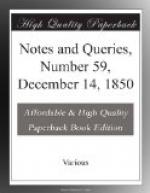“The beginning and ground of that attribute of DEFENDER OF THE FAITH, which hath been perpetually, in the later ages, added to the style of the kings of England, (not only in the first person, but frequent also in the second and in the third, as common use shows in the formality of instruments of conveyance, leases and such like) is most certainly known. It began in Henry the VIII. For he, in those awaking times, upon the quarrel of the Romanists and Lutherans, wrote a volume against Luther,” &c.
Selden then states the well-known occasion upon which this title was conferred, and sets out the Bull of Leo X. (then extant in the Collection of Sir Robert Cotton, and now in the British Museum), whereby the Pope, “holding it just to distinguish those who have undertaken such pious labours for defending the faith of Christ with every honour and commendation,” decrees that to the title of King the subjects of the royal controversialist shall add the title “Fidei Defensori.” The pontiff adds, that a more worthy title could not be found.
Your correspondent, COLONEL ANSTRUTHER, calls attention to the statement made by Mr. Christopher Wren, Secretary of the Order of the Garter (A.D. 1736), in his letter to Francis Peck, on the authority of the Register of the Order in his possession; which letter is quoted by Burke (Dorm. and Ext. Bar., iv. 408.), that “King Henry VII. had the title Defender of the Faith.” It is not found in any acts or instruments of his reign that I am acquainted with, nor in the proclamation on his interment, nor in any of the epitaphs engraved on his magnificent tomb. (Sandford, Geneal. Hist.) Nor is it probable that Pope Leo X., in those days of diplomatic intercourse with England, would have bestowed on Henry VIII., as a special and personal distinction and reward, a title that had been used by his royal predecessors.
I am not aware that any such title is attributed to the sovereign in any of the English records anterior to 1521; but that many English kings gloried in professing their zeal to defend the Church and religion, appears from many examples. Henry IV., in the second year of his reign, promises to maintain and defend the Christian religion (Rot. Parl., iii. 466.); and on his renewed promise, in the fourth year of his reign, to defend the Christian faith, the Commons piously grant a subsidy (Ibid., 493.); and Henry VI., in the twentieth year of his reign, acts as keeper of the Christian faith. (Rot. Parl., v. 61.)
In the admonition used in the investiture of a knight with the insignia of the Garter, he is told to take the crimson robe, and being therewith defended, to be bold to fight and shed his blood for Christ’s faith, the liberties of the Church, and the defence of the oppressed. In this sense, the sovereign and every knight became a sworn defender of the faith. Can this duty have come to be popularly attributed as part of the royal style and title?




